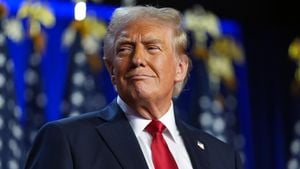The call for peaceful elections across Africa has gained renewed urgency as various stakeholders reflect on the stormy political climates observed during recent electoral processes. Throughout the continent, the importance of ensuring transparent, fair, and peaceful elections cannot be overstated, but the question remains: how can stakeholders effectively contribute to fostering this peace?
Recent developments have amplified conversations around election integrity, particularly as various nations gear up for their electoral cycles. Observers recognize the role of civil society organizations, governments, religious institutions, and traditional leaders as pivotal players on this stage. Their involvement is not just about monitoring; it’s about actively promoting dialogues and creating groundwork for peaceful coexistence.
Dr. Bossman Asaare, Deputy Commissioner of the Electoral Commission (EC) of Ghana, recently stated during interviews about upcoming elections, “We allow all those who want to observe to apply. Once you apply, we look at your track record and experience.” His remarks are especially pertinent now, considering Ghana has plans to conduct its elections soon. Observers and organizations must be vetted appropriately to prevent any undermining of the election process.
Yet, civil society groups have raised concerns over the denial of election observation status to certain organizations. For example, the Civil Society Coalition decried the denial of accreditation from the EC, asserting it undermines the credibility of upcoming elections. Adib Sani, the coalition's convenor, highlighted how the denial disrespected organizations with established histories of ensuring electoral integrity. “It is surprising and worrisome,” he remarked, amplifying calls for greater transparency.
Across borders, Cape Verdean President José Maria Neves recently expressed his concerns about post-election violence and the need for dialogue amid unrest following elections in Mozambique. “The situation is very tense, with daily protests, approximately 50 deaths, nearly 200 arrests and close to 800 injuries,” Neves revealed. His intervention emphasizes dialogue and reconciliation among political contenders as central to pacifying the unrest, advocating for civility when electoral disputes arise.
Echoing these sentiments, religious leaders and traditional authorities have been identified as key stakeholders who can spearhead peace initiatives. Their moral authority resonates deeply within communities, allowing them to act as neutral observers and conflict mediators during elections. By involving these figures, stakeholders can leverage their influence to promote peace and mitigate tensions surrounding the elections.
For example, religious leaders can undertake public education initiatives stressing the significance of peaceful elections. Through their platforms, they have the power to encourage voters to prioritize democratic values and denounce violence. Durbars, sermons, and community meetings can all serve to instill values of unity and democracy, counteracting factors leading to electoral conflict.
On the ground, the goal would be to position these leaders at polling stations, particularly in regions prone to disputes. Joint teams of religious and traditional observers can help bolster neutrality and inclusivity. A well-structured logistical support system would facilitate their efficient operations, allowing immediate communication with security forces and central monitoring centers.
These proactive measures would not merely aim to maintain peace during elections, but they also serve the dual purpose of reinforcing community bonds. The participation of traditional leaders fosters collective responsibility, enhancing trust between the electorate and electoral processes.
Indeed, moving forward means institutionalizing the roles of religious and traditional leaders within the electoral framework. Continuous training and engagement would build a skilled pool of observers at every election, equipping them with the tools and knowledge necessary to contribute effectively. They could also play significant roles post-election, aiding recovery and reconciliation efforts to heal societal fractures caused during tense electoral periods.
Interestingly, Dr. Bossman Asaare emphasized the need for such inclusive approaches during his recent engagements. He noted how the participation of local stakeholders promotes higher election integrity and confidence among voters: “We have to engage every sector of society; including civil body organizations provides us with checks and balances we critically need,” he stated.
Leadership and political will are also instrumental. Mozambique’s President Filipe Nyusi has called for calm, clearly recognizing the dangerous consequences of continued unrest. While urging peace amid tensions, he also invited conflicting parties to the negotiating table. “We need resolution through dialogue,” he articulated, drawing attention to the necessity of empathy and communication over conflict.
From these examples, it is clear there exists a common thread throughout Africa’s political climate: Effective elections hinge upon collaboration between various stakeholders, including civil society, government entities, religious and local leaders, and ordinary citizens. Each group warrants attention and respect, contributing unique perspectives and solutions to maintain peace and democracy.
Engagement across sectors ensures shared ownership of the electoral process and encourages voter participation. While subsequent elections hold the potential to ignite unrest, they can also act as catalysts for unity when handled correctly. Capacitating stakeholders to operate effectively during elections, alongside constructing favorable political environments, protects the health of democracies.
At the heart of these discussions lies the fundamental notion: Peaceful elections must be treated as collective responsibilities rather than merely administrative tasks or political mechanical processes. By working together collaboratively—civic organizations, religious bodies, elders, governmental institutions, and citizens—Africans will fortify their commitment to democratic principles and stability.
Ghana stands poised to usher forth not only successful elections, but also resilience through communal values and proactive inclusive policies. Through these concerted efforts, Africa can progress toward tranquil and honest electoral environments, establishing standards of integrity for democracies worldwide.
It is, after all, through these grassroots initiatives and shared aspirations for peace among diverse societal actors, where the fabric of democracy weaves together for the benefit of generations to come.



